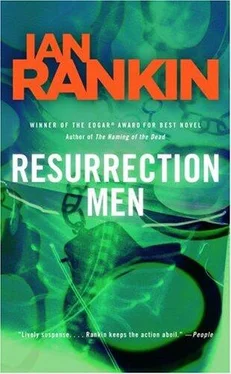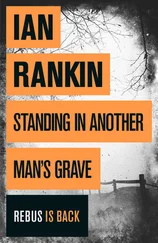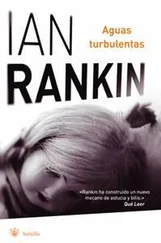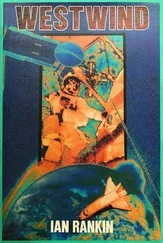“Neilson doesn’t own a car. No point, since he’s never learned to drive.”
“Then how did he get the painting back here?” Rebus knew the way her mind was working. He stood up, watching her nodding slowly. “Right now,” he told her, “what matters is that you’ve found the painting stolen from the victim’s house.”
“And isn’t that convenient?” she said, staring at him.
“Okay, I admit it . . . I had it hidden under my jacket . . .”
“I’m not saying you put it there.”
“But someone else did?”
“Plenty of people knew Malcolm Neilson was a suspect.”
“Maybe his prints will be all over the glass. Would that be enough to satisfy you, Siobhan? Or how about a bloodstained hammer? Could be there’s one tucked away in the shed, too . . . And by the way, I meant what I said.”
“About what?”
“It was you that found the painting. Me, I’m not even here, remember? You go telling Gill that it was John Rebus who found the crucial piece of evidence, she’s going to have both of us on the carpet. Get one of the woolly suits to give me a lift back into town . . . then let Gill know what you’ve found.”
She nodded, knowing he was right, but cursing the fact that she’d let him come here.
“Oh, and Siobhan?” Rebus was patting her on the arm. “Congratulations. Everyone’s going to start thinking you walk on water . . .”
Presented with the evidence of the stolen painting, Malcolm Neilson offered no explanation at first, then said it had been a gift from Marber, before changing his mind again and stating that he’d neither seen nor touched the painting. His fingerprints had already been taken, and the painting itself was sitting at Howdenhall police lab, being dusted for prints before undergoing other, more arcane tests.
“I’m curious, Mr. Neilson,” Bill Pryde asked. “Why that particular painting, when there were others more valuable right there under your nose?”
“I didn’t take it, I tell you!”
William Allison, Neilson’s solicitor, was rapidly jotting notes by his client’s side. “You say it was found in Malcolm Neilson’s garden shed, DCI Pryde? Can I ask whether there was a lock of any kind on the door?”
Elsewhere in the station, the success of the search at Inveresk was being trumpeted, the noise bringing the Wild Bunch out of their lair and up to the murder room.
“You got a result then?” Francis Gray asked Derek Linford, slapping him on the back.
“ I didn’t,” Linford snapped back. “Too busy wading through three feet of shit in his studio the other side of town.”
“Still, a result’s a result, eh?”
The look Linford gave him seemed to dispute this. Gray just chuckled and moved away.
News was filtering down that fingerprints had been found on the picture frame. Problem was, they belonged to Edward Marber himself.
“At least we know we’ve got the right painting,” one officer said with a shrug. Which was true enough, though still not enough to satisfy Siobhan. She was wondering about the picture’s subject matter, wondering if in Marber’s eyes the woman in the mask had represented Laura. Not that the two shared physical similarities, but all the same . . . Did Marber place himself in the man’s role? The voyeur, or maybe even the possessor . . . thinking about the merchandise?
The painting had to mean something. There had to be a reason why it alone had been removed from Marber’s house. She remembered the sales chit for it, which had turned up among Marber’s effects. Five years back he had paid £8,500 for it. These days, according to Cynthia Bessant, it might fetch four or five times that, a more than decent return on the investment, but still some way short of other paintings in the dealer’s collection.
It had meant something to someone . . . something more than mere monetary value.
What could it have meant to Malcolm Neilson? Was he perhaps jealous of artists more successful than himself?
Another hand slapped Siobhan’s shoulder. “Good work . . . well done.” She’d already deflected a phone call from the assistant chief constable, Colin Carswell. She knew he would want to share in her glory, and had no intention of talking to him. Not that she wanted the glory all to herself; far from it.
She wanted nothing whatsoever to do with it.
Because to her mind it fell well short of glory . . . yet might end up putting an innocent man away.
One of the Tulliallan crew — Jazz McCullough — was standing beside her now.
“What’s up?” he asked. “Not joining in the fun and games? Case must be cut and dried, I’d’ve thought.”
“Maybe that’s why they sent you back to training school.” She saw a rapid change in his eyes. “Christ, sorry . . . I didn’t mean to say that.”
“I’ve obviously caught you at a bad time. I just wanted to offer my congratulations.”
“Which I’ll gladly accept . . . after we get a conviction.” She turned and walked away, aware of McCullough’s eyes following her all the way to the door.
Rebus saw her go, too. He was catching a word with Tam Barclay, asking if he had a nickname for DCI Tennant.
“I can think of a few choice ones,” Barclay was saying. Rebus nodded slowly. He’d already spoken to Stu Sutherland, and knew damned well that “Half-Pint” was a name used only by Gray, Jazz and Allan Ward. Now Jazz was motioning to him. Rebus wrapped up his conversation with Barclay and made to follow. Jazz walked down the corridor and into the toilets. He was standing by the washbasins, hands in pockets.
“What is it?” Rebus asked.
The door opened again and Gray came in. He nodded a greeting and checked that no one was lurking in the cubicles.
“When are you going to recon the merchandise?” Jazz asked quietly. “Only, if there’s a chance it may be moved, best get your arse in gear.” His voice was cold and calculating, and Rebus felt his liking for the man start to ebb.
“I don’t know,” he said. “Maybe tomorrow?”
“Why not today?” Gray said.
“There’s not much of today left,” Rebus told him, making a show of consulting his watch.
“There’s enough,” Jazz persisted. “If you went there right now. We could cover for you.”
“It’s not like we’re unused to you bunking off,” Gray continued. “Funny you shot back here just before they found that picture . . .”
“What’s that supposed to mean?”
“Let’s focus on something else,” Jazz warned both men. “We’ll call it the big picture, if you like.”
Gray grinned at this.
“We need some fast info, something we can work from,” Jazz went on.
“What about Allan?” Rebus asked. “Is he in or out?”
“He’s in,” Gray said. “Though he didn’t like the way you teased him.”
“Does he know what’s involved?”
“Less Allan knows, better he likes it,” Gray explained.
“I’m not sure I understand.” Rebus was angling . . . hoping for a bit more.
“Allan does what he’s told,” Jazz said.
“The three of you . . .” Rebus hoped he sounded naive enough. “You have done something like this before?”
“That’s on a need-to-know basis,” Gray told him.
“I need to know,” Rebus stated.
“Why?” The question came from Jazz.
“A little knowledge can be a dangerous thing,” Gray said into the silence. “How about your friends in the SDEA? Are you going to pay them a visit or not?”
“What option do I have?” Rebus tried to sound disgruntled. He could feel Jazz’s eyes still on him.
“It’s still your show, John,” Jazz reminded him quietly. “All we’re saying is that it can’t be put off forever.”
Читать дальше












